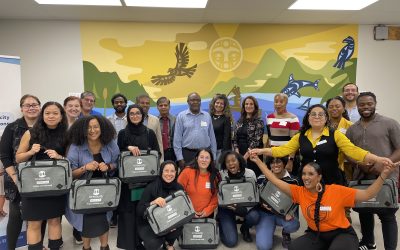I had the pleasure of interviewing Mebrat Beyene, Executive Director of WISH Drop-in Centre Society, earlier this month, and am happy to be able to share with you what I learned throughout our conversation. We talked about the challenges residents of the Downtown Eastside and the organizations supporting them face, and the incredible work they are doing to find solutions. Below is a condensed version of the interview; I invite you to find the full version at the bottom of this page if you would like to know more about this important perspective on a core community in the Vancouver area.
As most Lower Mainland residents have no context for what it is like to be part of the Downtown Eastside (DTES) community or work closely with the residents of the DTES, I’d like to ask you a few questions to give an idea of what your work is like. Why is it crucial to be inclusive of this community? Where do we get reliable information about what is happening? And how can we show our support? So, with all that in mind, thank you for taking the time to speak with me and I’m looking forward to hearing what you have to say.
First, what does WISH stand for and how does its mandate look?
WISH’s original name is Women’s Information Safe Haven. Our mandate is to support women in street-based sex work, and we have a vision that every woman should have the opportunity to make safe, healthy, and positive choices.
Before COVID-19, what would you have said were the biggest challenges facing residents in the DTES?
Ironically, the biggest challenges are not much different. What we are seeing now is just an exacerbation of all those issues. The biggest challenges are all stemming from our collective inability to address poverty on a larger, more comprehensive scale, and the other impacts of poverty: homelessness, housing crisis, adequate supports for mental health and [physical] health (so we can address safe drug supply and the ongoing opioid crisis). We’re now just seeing them at a level that is even more dramatic and that I think people outside of the DTES are sort of paying attention to and are feeling a little bit of the shock of it now…
Your answer plays right into my next question: Getting more into our current reality, how have those challenges changed or been impacted? What I’m taking away is people are seeing how this is an issue which affects everybody as the situation becomes more dramatic.
It is an issue that affects everybody; but if we put an equity lens on everything as we typically do, it is affecting everybody differently. What we are seeing in the DTES right now is not even the effect of positive COVID results yet. It is the effects and the impacts of less access to services, supplies, sanitation, and income.
For the women we support, sex workers would have been the first people to really feel the impact of dramatic and sudden loss of income. So once again, it’s coming back to issues of poverty, racism, stigma, discrimination, criminalized communities, criminalized activity, and the harm of all those issues compounded – with the existing crises of poverty, homelessness, and the opioid crisis.
Is there an example you can give of how COVID-19 has compounded the pressures organizations are under – given the pre-existing challenges like the opioid crisis?
The opioid crisis was a huge problem to begin with, and the number of people we lost due to the opioid crisis far surpasses COVID; except this time COVID is affecting people who are not drug users, who aren’t in the DTES, not poor, not street-based sex workers. In terms of pressures compounding organizations and residents, drug use does not stop[1]. Whatever dependencies you have aren’t going to magically stop. There are fewer drugs available, or they’re harder to get or afford.
Safe drug supply has been made possible, which is revolutionary and remarkable that City Council passed [that motion]. Getting it to happen on the ground is slower. People are not able to access physicians for prescriptions or access their meds or their drugs quickly, so we are seeing people who are dope-sick and in withdrawal. They are put in even more of a desperate situation so the ability to make safe and healthy choices is getting harder.
Secondly, all the measures we have put in place for physical distancing is also having an impact on peoples’ ability to use together and to keep each other safe in case of an accidental overdose. With restrictive guest policies being mandated to contain COVID, people can’t have guests in their rooms who may have been their spotters – the person who would revive them or call for help. For sex workers who rely on trading sex for their income – and where drug use and drug acquisition might be tied in with sex work – it’s the same challenge. Not only are they cut off from their ability to make money, they are also compromised in their ability to obtain their meds and their drugs.
You mentioned a term earlier: “Dope-sick”, is that another word for withdrawal?
Yes. And it’s interesting because sometimes it can look like some of the symptoms they’re talking about with COVID. It’s been interesting to see the shift in response because these might be symptoms we deal with all the time so it’s really challenging to be able to keep light on the fact that these were emergencies we were already dealing with before COVID.
Knowing the DTES is a tight-knit community in many ways where people are dependent on each other for survival, does this look the same throughout the COVID-19 crisis? Is there anything workers are doing to promote the safety of the community specific to the pandemic (physical distancing, for example), or is this a non-option and why?
Without safe housing, and with spaces now limited, closed, or reduced in some way, there are fewer places for people to just “be” in the community. Sidewalks are more crowded. There is no physical distancing happening. I think the combination of the logistics aren’t even possible (if all the services have provided meals to-go because communal eating is now unsafe, people with to-go containers have nowhere to eat. They congregate in parks, on sidewalks, and benches). If all your services, connections, and friends are in that ten-block radius, you’re going to stay.
And to your question “are workers doing anything to promote safety…” Yeah, all of us are coming together. There are entire networks within the DTES of different groups of service providers connecting all week long around community-wide responses. We are looking at: “Are there any unused spaces that can be activated?” Empty lots which can be expanded in the same way WISH has done with our secure back lot. That’s the community-led response I’m talking about.
Is there an example of what collaboration between not-for-profits / other support services in the DTES looks like?
There are so many examples! I think we naturally collaborate and partner. Right now, what we’re seeing is quite broad and selfless despite funding that can typically risk pitting us against each other or competing for funds. But I’m seeing something rising above that and really challenging that trope and structure. We’re borrowing materials and supplies from each other. If one organization can make a purchase for another – that’s happening right now!
One great example within the last couple days: WISH had been working to get our back lot as an extension of our services and a washroom trailer out back as a much safer solution than port-a-potties (and to avoid some of the tragedies we’ve seen with the port-a-potties) but we were stuck waiting for funding. Union Gospel Mission stepped in to see if they can help fund the rental of a washroom trailer on our lot. That’s beautiful! (Since the interview, the bathroom project has been approved. WISH now has a 24/7 access washroom trailer on site.)
What could others – individuals and governments – do to help you achieve those priorities?
Don’t guess at what is helpful – just ask. Don’t say “Hey, I have this idea for a program!” [laughs]. Every single non-profit – if you provide cash donations, we can do so much more with that. If you supply the cash, we can use it in the most efficient way. If non-profits are asking for physical donations, pay attention to what kind. A lot of times out of good will people bring things down that are not helpful or that we can’t use, and we then have to deal with sorting or disposing of it, using staff time that should be directed towards delivering programs, instead.
Trust the organizations with long-standing relationships and expertise, that they will leverage your funding and get it done in the most appropriate way.
Is there anything else you want people to know I have not addressed?
I would encourage people to think about the DTES as a neighbourhood deserving as much respect, attention, and dignity as any other neighbourhood… and to think about the inconveniences and hardships people are experiencing now due to COVID may only be a tiny fraction of what the DTES experiences on a daily basis. If people are feeling a bit of panic about where their next paycheque is going to come from, and if anyone has experienced panic in this time around “Oh wow! There’s not as many things on the shelves as before,” just imagine that, times 50, every single day. I wonder if this could be an opportunity for people to have a little more humility and compassion for what it must be like to live in poverty with multiple health and safety emergencies 24/7.
[1] If someone is drug-dependent, suddenly abstaining from all use can result in dangerous or deadly withdrawal symptoms.
Open an accessible PDF of the full interview in a new tab here.
Author
Rowan King
Rowan takes care of the marketing and communications side of Vantage Point. He designs the newsletters you see in your inbox, edits the videos and podcasts you stream, populates the social media feeds you follow, and more! Rowan has a passion for accessibility and information collection (i.e.,…
Related Posts
Funding What Works: Strengthening BC’s Non-Profit Sector Through Multi-Year and Core Funding
Following October’s BC Non-Profit Lobby Day, we have developed this policy paper to support our continued collective advocacy for funding policy changes in our sector.
BUILD: Stronger BIPOC-Led Non-Profits across BC and the Yukon
The BC government faces a continuing trade war, tariffs, a tightening federal government, and an unstable economy. All these..




0 Comments